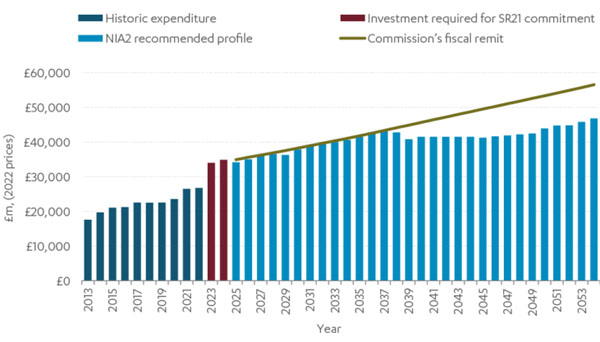Public spending plans beyond the current Parliament suggest that the UK will be unable to afford the infrastructure it needs, the Government’s official advisers have said.
The National Infrastructure Commission (NIC) has published its Infrastructure Progress Review 2024 following last October’s second National Infrastructure Assessment, which set out a costed package of recommendations.
The progress review notes that the Government’s stated plan beyond 2024-25 would freeze overall capital spending in cash terms and says that if this was applied to infrastructure spending, ‘it would not be consistent with the funding profile the Commission has set out to deliver the recommendations in the second Assessment’.
In the document’s foreword, NIC chair Sir John Armitt (pictured) wrote: ‘A window remains to ensure that practical delivery plans are in place, backed up by the necessary public and private funding, to help achieve economic and environmental goals that will improve life for British households.
‘But the window is closing, at least if we don’t want to delay those benefits and compound the disruption of recent years.’
The review adds that the Government risks breaking its pledge to spend £100bn on infrastructure between 2022 and 2025.
It paints a ‘mixed picture of progress towards key infrastructure goals’, noting that while UK infrastructure performs well in some areas, ‘significant deficiencies’ in others are holding back productivity and impacting quality of life.
‘These include under investment in transport systems in regional English cities, the failure to build major water resource reservoirs in England in the last 30 years, too many properties being at risk of flooding, and recycling rates which have stalled for a decade.’
The document criticises the decision to scrap the second leg of HS 2 without a concrete plan for improving connectivity and capacity in the North and Midlands, which it says ‘creates uncertainty which will inhibit economic growth in the affected regions’.

Public investment in economic infrastructure, 2013-2054. Source: NIC
On funding within regions, it says that if funding levels recently announced for five-year City Region Sustainable Transport Settlements are maintained for the next 20 years, that would broadly be in line with the recommended levels in the second Assessment.
Similarly, recent increases in local road maintenance funding are also in line with the Assessment, the review notes. However, it argues that Transport for London and other authorities responsible for transport beyond mayoral combined authorities need five-year funding settlements.
The document also notes that the £4.7bn Local Transport Fund only covers authorities in the Midlands and North.
Specifically on roads, it notes that the third Road Investment Strategy should have been published by the end of last year and said the Government should publish it as soon as possible.
It adds: ‘Funding for this strategy should also match the original funding allocation of around £27 billion for the second Road Investment Strategy.’
The review suggests that recently updated National Policy Statements, including for national networks, should ensure faster decision making on major projects, but adds that opportunities remain to go further by expanding community benefits for hosting infrastructure.
Register now for full access
Register just once to get unrestricted, real-time coverage of the issues and challenges facing UK transport and highways engineers.
Full website content includes the latest news, exclusive commentary from leading industry figures and detailed topical analysis of the highways, transportation, environment and place-shaping sectors.
Use the link below to register your details for full, free access.
Already a registered? Login